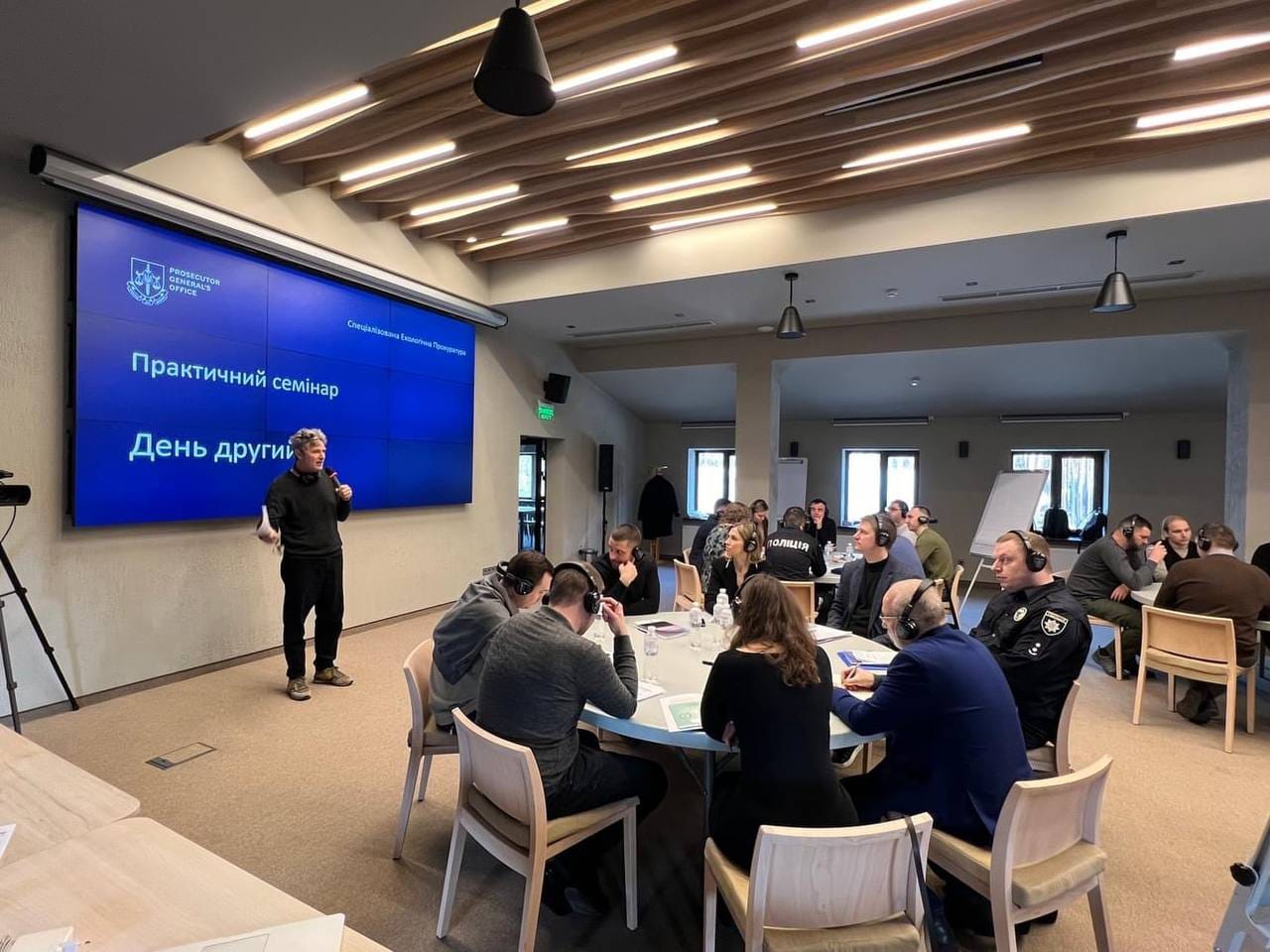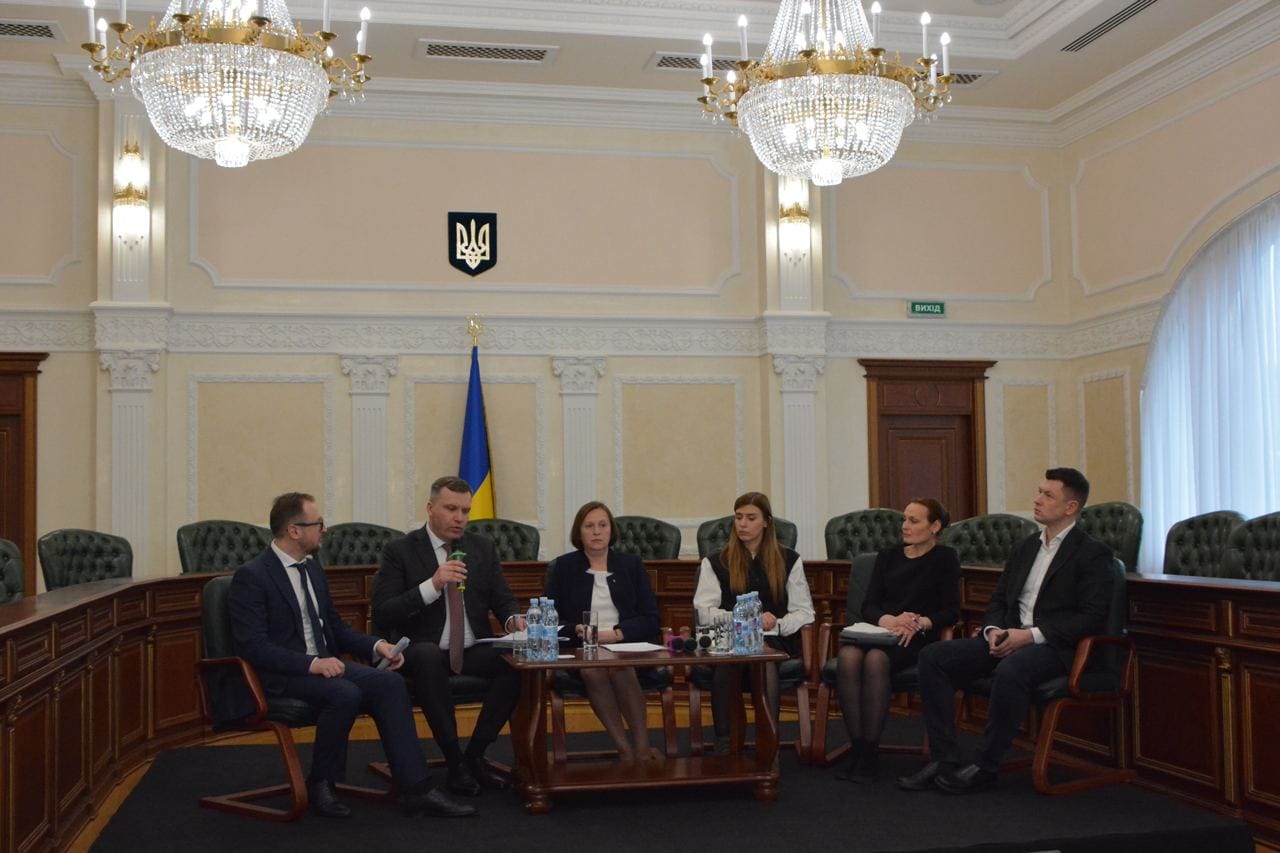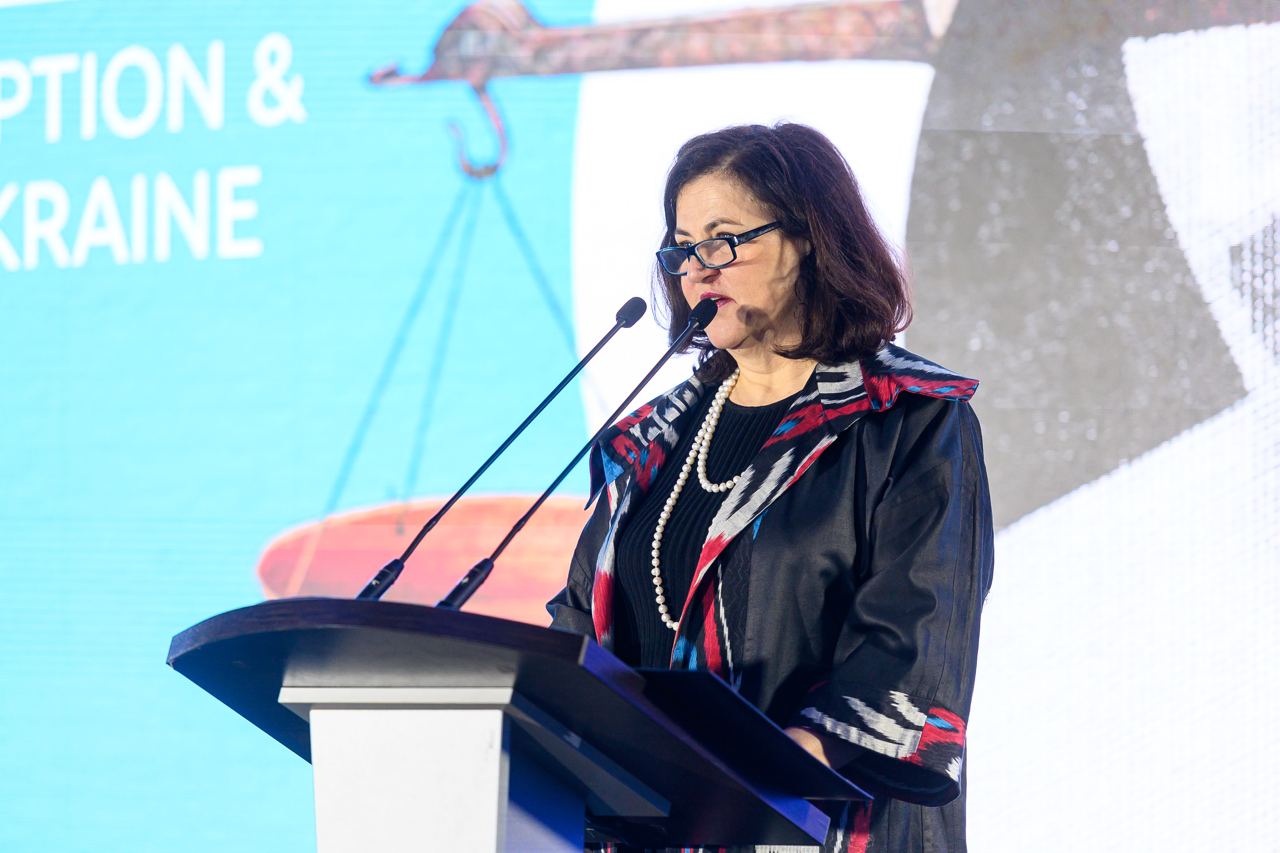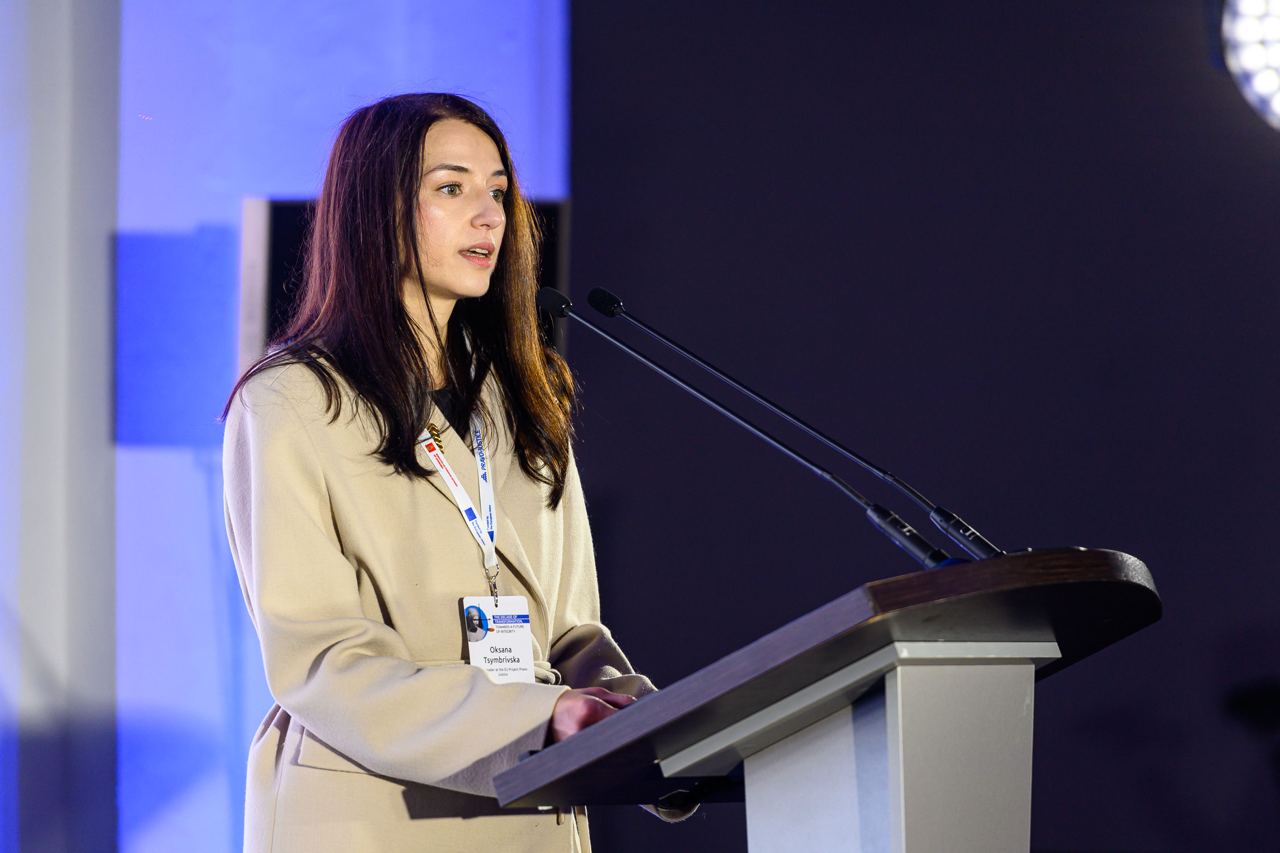Digest of Events of EU Project Pravo-Justice for March 25 – April 28 2024

We continue informing about top news of the EU Project Pravo-Justice. Meet the next issue of the Project Digest.
- Experts of EU Project Pravo Justice took part in the workshop for prosecutors of the Specialised Environmental Prosecutor’s Office on prosecuting war crimes causing environmental damage.

The participants to the workshop thoroughly analysed war crimes involving long-term, widespread and irreparable damage to the environment from the perspective of national legislation, international criminal law and humanitarian law. Moreover, prosecutors and experts identified key issues to be taken into account when investigating these crimes; they also agreed to draft a strategic plan for investigating war crimes involving environmental damage.
- On 25 March, the Office of the Prosecutor of the International Criminal Court held a hybrid roundtable event on forensic support and field deployment at the scenes of international crimes. The event gathered experts from over 30 countries working in the accountability sector.
“In the Office’s dynamic and challenging operating environments, we must be able to rely increasingly on forensic capacity, and the mobilisation of external experts at short notice, drawing upon the scientific community to ensure the highest possible standards of practice. This collective work must deliver results across situations and draw on the global network of expertise in the Rome Statute community and beyond”, said Karim Khan, Prosecutor of the ICC, in his opening remarks.
- On March 29, took place the event “Discussions on Contemporary Challenges Before the Judiciary: Building Institutional Capacity in the Conditions of War and the Post-War Period”, organised by the High Council of Justice with the support of EU Project Pravo-Justice.

In turn, Component Lead of Judiciary Reform Component of EU Project Pravo-Justice Volodymyr Chaban said that the Disciplinary Inspectors Service should be created as soon as possible, while, of course, not at the detriment of the quality of the competition. He drew attention to the fact that that task was present both in the European Commission’s report on Ukraine within the framework of the EU Enlargement Package, published at the end of last year, and in the Ukraine Facility Plan. Thus, according to the latest document, by the end of 2025, 20% of disciplinary complaints that had not been considered as of December 31, 2023 shall be considered with the participation of the DIS.
“These documents need to be looked at comprehensively and strategically. The sooner the Disciplinary Inspectors Service is created, the more time it will have to fulfill this requirement of the Ukraine Facility Plan. In particular, not only the rapprochement of our country with the EU depends on it, but also the financial support of Ukraine by European partners, which is now extremely important and necessary,” said Volodymyr Chaban.
- On April 4-5, 2024, with the support of the European Union Advisory Mission in Ukraine, a working session on the preparation of the “Standard for Individual Performance Assessment of the Prosecutor (Administrative Position)” was held.
The event was attended by the representatives of the Office of the Prosecutor General, Prosecutor’s Training Center of Ukraine, as well as EUAM Ukraine, Council of Europe Office in Ukraine – Kyiv, IDLO, and EU Project Pravo-Justice.
The participants to the event discussed in detail the criteria for evaluating the work of prosecutors and, as a result, developed a draft of standards for individual performance assessment for heads of prosecutors’ offices.
- On April 5, the round table “Enforcement of Decisions by PEOs. Problematic Issues and Judicial Practice” was held; it was organised by the Supreme Court together with the Association of PEOs of Ukraine; SE “SETAM”; with the support of EU Project Pravo-Justice.

During the event, Oleh Mykhaliuk, Key Expert on Economic Justice, EU Project Pravo-Justice, noted that the issue of enforcing court decisions in the private sphere is not only an element of the rule of law, but also a prerequisite for macro-financial stability, which, among other things, is determined by how effectively creditors can exercise their rights.
“The reconstruction of Ukraine requires attracting investments, the amount of which will depend on whether creditors will feel protected by the judicial system and PEOs. Potential investors evaluate the effectiveness of the judicial system depending on whether they can predictably and effectively ensure the fulfillment of obligations and collect debts. The Supreme Court’s case law has a significant impact on the approaches to the execution of court decisions, ensuring their predictability and harmonisation,” said Oleh Mykhaliuk.
- On April 12, the training “Introduction to Criminal Proceedings in International Courts and Tribunals” took place in Kyiv; it was organised for employees of court apparatuses by EU Project Pravo-Justice together with the State Judicial Administration of Ukraine.

During the one-day training, court employees received a full understanding of the key concepts and practices needed to support judges in war crime cases. The training was delivered by the experts of EU Project Pravo-Justice Anna Stakhanova and John Cubbon.
- On April 16, the official opening of EU Project Pravo-Justice and EU Anti-Corruption Initiative took place at the event that was held in Mystetskyi Arsenal and attended by EU Ambassador to Ukraine Katarina Maternova.

At the beginning of 2024, the third phase of Pravo-Justice began, which will also be adapted to Ukrainian realities. It comes to promoting prosecution for international and war crimes, further transformations of the judicial system, including the execution of court decisions, and supporting the process of European integration within the framework of the activities of the justice sector institutions. It is planned to expand cooperation with CSOs and continue advancing EU Project Pravo-Justice as a coordination platform for the justice sector institutions in Ukraine.

“By officially starting the third phase of EU Project Pravo-Justice, we will continue to unwaveringly contribute to further reform of the judicial system; prosecution of international crimes; and support of European integration processes in the field of rule of law. Together, we strive to build a future where justice is boardless, and the principles of justice and accountability underlie our joint efforts,” mentioned Oksana Tsymbrivska, Team Leader of EU Project Pravo-Justice, in her speech.
- On 19 April, with the support of EU Project Pravo-Justice, a working meeting was held to draft the Strategy for the Development of the Public Prosecution Office for 2024-2027.
Prosecutor General Andrii Kostin, his deputies, heads of departments of the Office of the Prosecutor General, as well as representatives of international partners, including EU Project Pravo-Justice, summarised and analysed the approaches already developed and agreed on further steps.

“EU Project Pravo-Justice is honoured to support the development of the Strategy for the Development of the Public Prosecution Office for 2024-2027. In this policy document, which is currently being drafted, we put special emphasis on human-centred approaches. It will prioritise the rehabilitation, reintegration and support of those affected by the full-scale invasion. It will also reflect our ongoing efforts to reform and improve the processes and practices within the Public Prosecution Office since 2019,” noted Oleksandra Dermanska, Key Expert on Public Prosecution Office Reform, at the meeting
- On April 20-21, the Mediation Workshop was held in Chernivtsi. The event was organised by the Students League of the Ukrainian Bar Association and the Academic and Research Laboratory of Mediation, Negotiations, and Arbitration of the Chernivtsi National University with the support of EU Project Pravo-Justice”.

During the two-day intensive trainig, students got familiar, among others, with the theoretical and practical aspects of mediation, its tools, and prospects for development in Ukraine. Thus, Virgilius Valancius, Support to EU Integration Process in the Justice Sector Component Lead, EU Project Pravo-Justice, spoke about the experience of using mediation in EU countries.
“Mediation is not only about resolving conflicts or unburdening the judicial system. Mediation is generally about the way towards social peace in society,” said Virgilius Valancius.
- EU Project Pravo-Justice and the Ministry of Justice of Ukraine discussed the creation of an Interagency Coordination Council on the development of alternative (out-of-court) dispute resolution methods in Ukraine and the involvement of potential stakeholders. According to Oksana Tsymbrivska, Team Leader of EU Project Pravo-Justice, the creation of such a coordination platform will enhance access to justice for the users, which is extremely important in the context of European integration.
“Setting up an Interagency Coordination Council is of key importance in the context of ensuring effective coordination; standardisation of approaches, and strengthening of the institutional basis of ADR in Ukraine. Such a council will become an effective platform for interaction and cooperation on ADR at both national and international levels. The Interagency Coordination Council on ADR will contribute to systemic changes and achieving a sustainable effect for the people and the state; it will allow avoiding duplication of efforts and optimizing the implementation processes,” underlined Oksana Tsymbrivska.
- On April 25, the XVIII Forum “Development of the Legal Services Market” [took place]. This is a platform for discussing the current state, latest trends, and prospects for the development of legal business in Ukraine
In his welcoming speech, Virgilius Valancius, Support to EU Integration Process in the Justice Sector Component Lead, EU Project Pravo-Justice, drew the attention of those present on the need to reform legal education in Ukraine. According to him, in the context of European integration, there is also a need to intensively adapt national legislation to the EU acquis.

Andrii Boiko, professor of the Criminal and Criminal Procedural Law Department, National University of Kyiv Mohyla Academy, expert of EU Project Pravo-Justice, spoke at the Forum. According to him, in order to implement legal education reform, there is a need to amend the existing legislation, in particular in terms of strengthening licensing and accreditation conditions and banning the training of lawyers in HEIs with specific conditions of study. The influence of the professional community on defining the standards of legal education, as well as the implementation of EU recommendations in the field of legal education reform, is also of major importance.